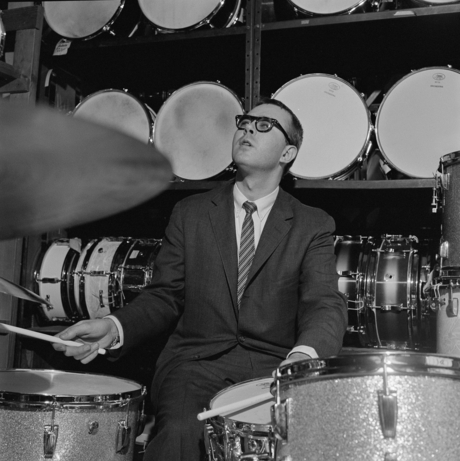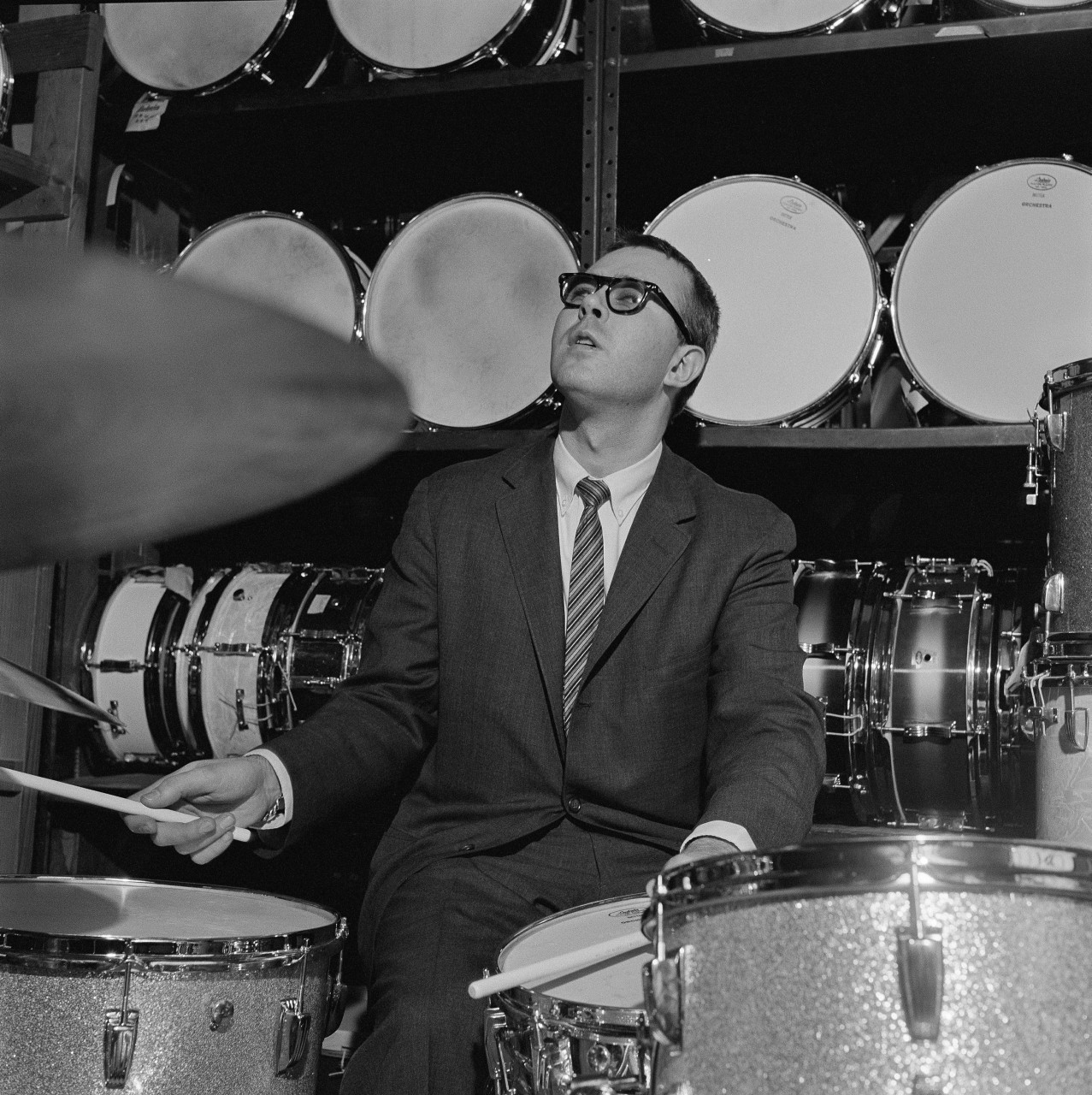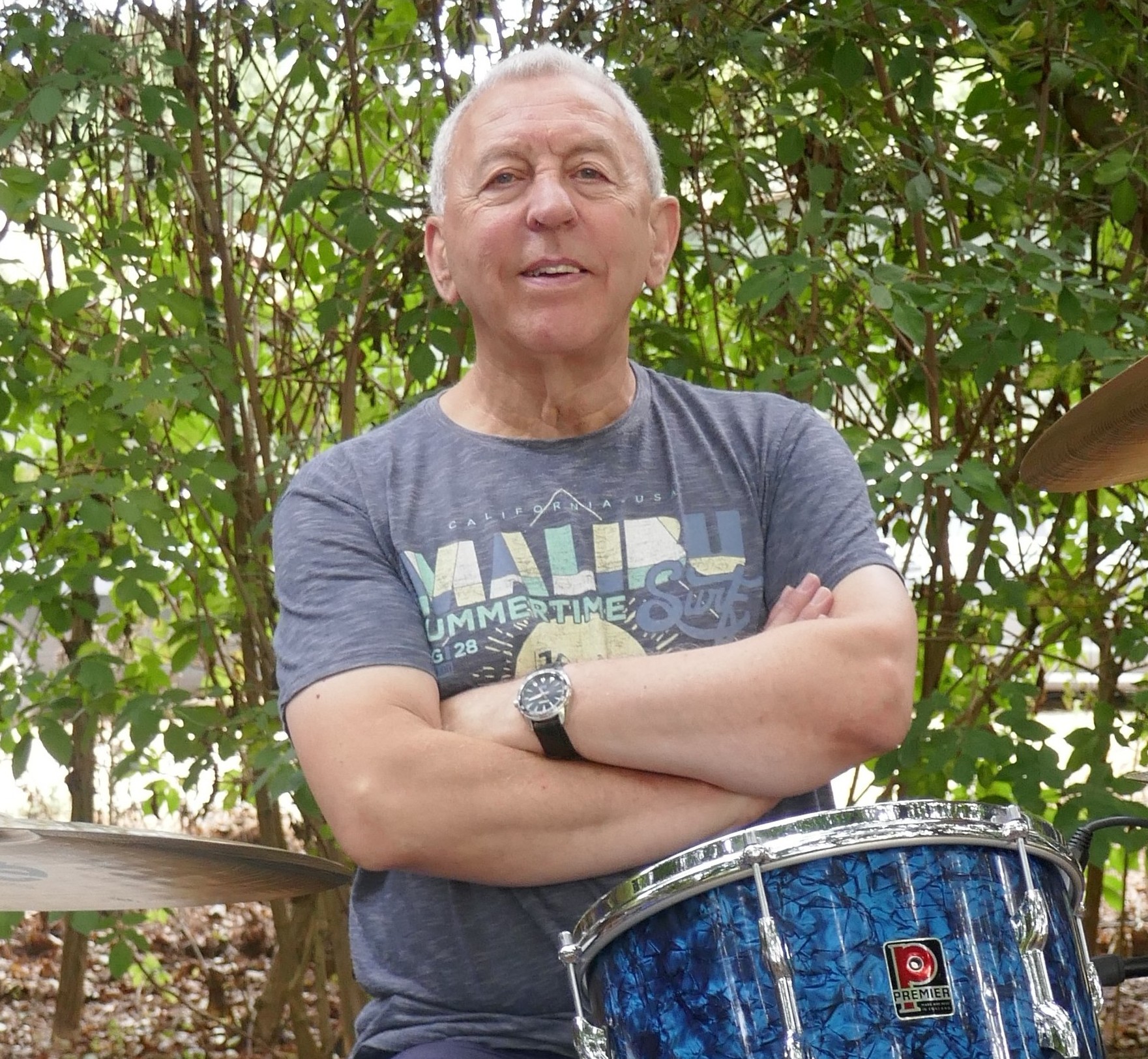Tribute: Joe Morello Interview
Rhythm Re-visited: Geoff Nicholls meets a drum legend


© Ted Williams/CORBIS
The drum world was deeply saddened to lose one of its most influential stars at the weekend as Joe Morello passed away, aged 82. In March 2010 Rhythm writer Geoff Nicholls spoke to the drum icon for a feature in the magazine. Here, in tribute to the great Mr Morello, is that interview in full...
Joe Morello's extraordinary flair with odd time signatures gave the Dave Brubeck Quartet its signature and passport to history. Geoff Nicholls chats with his childhood hero
Scaling the American charts in 1961, 'Take Five' was the first jazz single to sell over a million. Even more remarkable, 'Take Five' is in 5/4 time and climaxes with a drum solo. The drummer was Joe Morello, a man of immense musicality and technical finesse. Pianist Dave Brubeck's quartet married classical melodicism and odd time signatures with cool chamber jazz improvisation. Like Buddy Rich, Joe inspired rock drummers as much as jazzers, most tellingly that special British generation who would soon invent prog rock. They related to Joe's slamming 22" Ludwig bass drum, fat toms and pin sharp SuperSensitive snare as much as to his innovative rhythms. Anyone who's not heard Brubeck's live At Carnegie Hall, 1963 should order it today. On Joe's spectacular solo, 'Castilian Drums', you will recognise the hand drumming licks that John Bonham later used in his 'Moby Dick' solos.
Born in Massachusetts in 1928, Joe abandoned a promising career as a classical violinist (he was a soloist with the Boston Symphony Orchestra aged nine) when he turned to drumming at 15. His classical sense of touch, form, dynamics and subtlety informed all his drumming. Think Max Roach with Buddy's chops. On coming to New York he was head-hunted by Brubeck in 1956, elevating the quartet to massive worldwide popularity over the next decade.
Joe dominated drumming awards throughout the '60s, but his diminishing eyesight curtailed his later touring so that his profile is perhaps not as high today as it should have been. He's become a renowned teacher, adored by his many pupils who include Danny Gottlieb, Max Weinberg and John Riley. His books and DVDs are classics. Still active at 81, Joe retains his famous, self-deprecating wit, remarkable modesty and is gracious in praise of his contemporaries.
Joe, is it true you were initially reluctant to join the Brubeck Quartet?
Want all the hottest music and gear news, reviews, deals, features and more, direct to your inbox? Sign up here.
"When I joined, Dave wanted me to sign a contract and I said no, not right now. I'd seen them at Birdland and you'd just see Dave and Paul [Desmond, alto saxophone] with two spotlights. I said, 'I don't want to sit in the dark.' I was friends with Joe Dodge, the previous drummer, and he said, 'I haven't played a four-bar break in three years, Paul just wants me to play railroad tracks… straight!' I said, 'Good grief, these two clowns were expressing themselves and they got these two guys in the dark.' Dave said, 'I'll put your name on the marquee.' I said, 'You should put everyone's name on it.' So he said, 'We're doing a two month tour,' and I said, 'Okay, I'll do that and if you like what I do… but I want to be able to play, not sit there like a mummy.' 'Oh, he said, I'll feature you, we're opening up on a TV show in Chicago, join me there.'
"Anyway, the opening night was crowded and Dave says, 'Do you want to do a little drum thing?' I said, 'Sure.' Now the place goes crazy and Desmond and (bassist) Norman Bates stamp off the bandstand. So Dave went backstage and said, 'What did you guys leave for?' 'Well, we left because people were standing up and applauding the damn drum solo.' Paul said, 'Either Morello goes or I go, make up your mind.' So Dave said, 'Morello is not going…' Paul made a fool of himself."
Dave obviously recognised you were the next step in the band's evolution?
"That's what Dave told me, we needed a stronger drummer. I said to Paul, 'It's not my fault if people clap, I'm just playing.' He was so jealous. Every time I did a drum thing and got a standing ovation he just couldn't deal with it. He was the big star in the quartet, he didn't really speak to me for two months! We'd be driving for a couple of hundred miles and it was crazy."
"Take Five' sold quite well, about five million copies. It did a lot for the group."
But you stuck it out?
"Oh yeah, I said, 'You don't have to talk. I'm not working for you, I'm working for Dave.' It's the way I play and people enjoy it I guess."
In the end Paul wrote 'Take Five' for you and you eventually became friends?
"It's true, towards the end. There was nothing he could do. I started to win all the polls. I never expected that, I never even thought about it. The Playboy poll [seven successive years] and Downbeat, and even in your country, the Melody Maker. 'Take Five' sold quite well, about five million copies. It did a lot for the group."
Where did the 5/4 groove come from?
"It came from me. When Dave approached me he said do you think jazz can be played in any other tempo? I said sure, why not? And so Desmond came up with this tune. Dave wasn't used to playing that tempo, he just had vamps. It wasn't too long that he got right into it though and started to improvise over it. And the drum solo was really out, I just felt like doing that. It doesn't have any (obvious) form, although there is a form. I just move it all around, that's what made it interesting. People called me and said, 'How long did it take?' I said, 'Not that long [laughs]!'"
At the time, playing jazz in fives, sevens and nines, etc, was seriously radical.
"I'd done it at home in Springfield. I used to play things in 5/4 and 7/4 on my own. We had sessions and I'd say, 'Let's do this in sevens.' That would be a bar of four and a bar of three. You played in 3/4, 4/4 and then five was for cheese! Off balance. People thought I was nuts. They'd say, 'What do you want to do that for?' I said, 'Because it's different.' In classical music it's been done, so why not in jazz?"
And of course, you grew up playing classical music?
"Yeah, playing violin, and my family thought I was going to be the next Heifetz. I could play, but I just fell in love with the drums. I found good teachers. I studied with Joe Sefcik for about three years then went to Mr [George Lawrence] Stone in Boston, another great percussionist. I was very fortunate. And then Billy Gladstone, at Radio City Music Hall."
Gladstone has an almost mythical reputation.
"He was very, very good. I studied with him for quite a while. He'd say, 'You really want this, don't you?' I said, 'Yes, because I love the sound you're getting, the relaxation.' That was his whole thing. He could get a good sound on the drum, not like he was slamming."
Where did he get it from?
"He never talked about it much. He figured a lot of things for himself, the way he would hit the drum just like a melody. The drummers I studied with were all very good players, the techniques they were showing were good. They didn't play jazz, I could do my own thing, but I wanted to know how the instrument worked. That's why I studied with classical people. Over the years I developed this kind of finger control thing with the left and right hand and that is how I could get more speed, with the fingers closer to the drum. I listened to different drummers all over, of course. We went to many places, an amazing experience. We went where all that trouble is now - to Iran, Iraq and Afghanistan. The people were pretty nice. And in India, the tabla drummers were doing phenomenal things. One professor over there said, 'You pick up tabla music easily,' but I was just emulating the sounds they made, using sticks. I could memorise stuff, but I didn't know what I was doing."
"You played in 3/4, 4/4 and then five was for cheese! Off balance. People thought I was nuts. They'd say, 'What do you want to do that for?' I said, 'Because it's different.'"
On your 'Castilian Drums' solo you played beautifully with your hands. John Bonham copped some of that.
"That's what they say. He was a very fine and musical player."
Also on 'Castilian Drums' you rub your thumb across the snare batter, like a conguero.
"The inspiration came basically from the Indian things, with the fingers and the edges of the drums. I saw a lot of tabla players. The musicians sat there, nobody would play until the drummer arrived - everybody was bowing to this guy. We deliberately wanted to see music that was so different from our things, you know?"
You also did some legendary clinics in Britain.
"We travelled all over the world. We would play the Royal Festival Hall, and all through England and Scotland. I loved your country, the people were great, I had such good times, I loved those old railway hotels. You have some good drummers. Mr Ronnie Verrell. Phil Seamen was a legend, a character, a very good drummer. When we were doing the clinics, Ivor Arbiter said to me one time, 'A drummer friend wants to know if you could play together,' and I said, 'Certainly, why not?' That was Kenny Clare and he was a real nice human being and a great drummer. He used to come here [to the USA] with vocalists Cleo Laine and Tony Bennett. We would hang out till four in the morning drinking beers."
You met some of the rock guys too?
"Ringo came one time to see us and said hello and we exchanged some sticks. He made that group sound great, he did what he had to do and he did it well. He sure made a lot of noise, his groove was incredible. Everybody does their own thing and he had some good rhythm concepts, you could tell right away."
You also had a major influence on gear. Jazz guys had played White Pearl kits, but you made Silver Sparkle Ludwigs fashionable.
"Bill Ludwig used to say you and Ringo are keeping the company going. We sold them a lot of drums. Joe Sefcik had a Slingerland in Sparkle Silver and I said, 'I'd like to get myself a set like that.' Bill said, 'Why, we use that for parade drums?' But later he told me that in six months they sold more of those damn sparkle things…"
Do you still have those drums?
"There was a drummer called Dennis Neil who worked at the Talk Of The Town, he loved the kit and when I left England I gave him a set. He'd put in a sub so he could be with me on the road to check each concert. He'd say, 'Last night you did that and tonight you didn't…' Me, I didn't remember what I did!"
You and Buddy Rich touched rock drummers just as much as jazz drummers.
"Buddy became a dear friend and we were going to do something together. I'd see him at the Blue Note and between sets he'd go sit in the bus. He said, 'How would you like to do a thing with my band like Louie [Bellson] does?' I said, 'I'd love it, but that would be the best lesson I ever had!' He said, 'Oh come on!' I saw him once or twice after, but then he got sick and was in hospital."
Both you and Buddy achieved phenomenal left hand speed and control.
"I try to relax, not get tight. People say, 'It looks like you're doing nothing, you make it look so easy.' I say, 'Of course it is, I wouldn't be able to do it if it was difficult [laughs]!' Some drummers overdo everything for show, I never really got into that. Krupa was good at twirling sticks. I said, 'Gene, I tried your thing, I threw 'em up and they never came back!'"

Geoff Nicholls is a musician, journalist, author and lecturer based in London. He co-wrote, co-presented and played drums on both series of ‘Rockschool’ for BBC2 in the 1980s. Before that he was a member of original bands signed by Decca, RCA, EMI and more. ‘Rockschool’ led to a parallel career writing articles for many publications, from the Guardian to Mojo, but most notably Rhythm magazine, for which he was the longest serving and most diverse contributor.